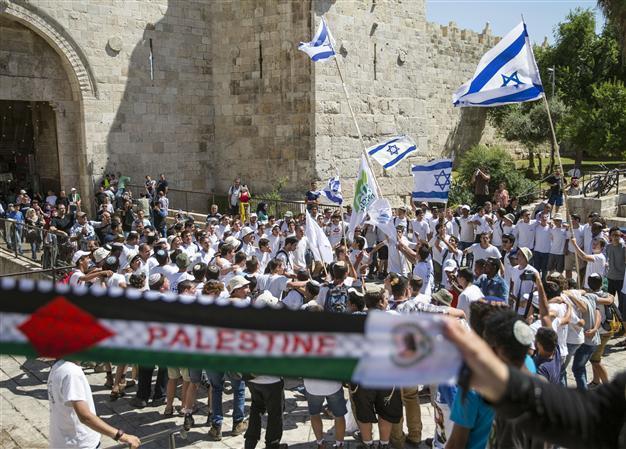Israel commemorates Jerusalem 'reunification'
JERUSALEM - Agence France-Presse

Palestinian women hold a scarf bearing the Palestine name as Israeli youths hold their national flag as they take part in the "flag march" through Damascus Gate in Jerusalem's old city during celebrations for Jerusalem Day on May 17, 2015 which marks the anniversary of the "reunification" of the holy city after Israel captured the Arab eastern sector from Jordan during the 1967 Six-Day War. AFP Photo
Israel marked the 48th anniversary of the "reunification" of Jerusalem on May 17 with thousands expected to join a controversial march through the city's Arab eastern sector which it captured in the Six-Day War.Known as Jerusalem Day, the anniversary marks Israel's seizure and later annexation of the territory, which includes the walled Old City, in a move never recognised by the international community.
The day is marked by a series of state ceremonies and an annual march through the Muslim Quarter of the Old City to the Western Wall, the holiest site at which Jews can pray, which is predominantly attended by nationalist hardliners.
Every year, police deploy in strength to secure the march, which frequently provokes clashes.
This year, two non-governmental organisations appealed to the Supreme Court to change the route so the march would not pass through the Muslim Quarter.
But last week, the court rejected the appeal, noting it did so "with a heavy heart." In their ruling, the justices stressed there should be "zero tolerance" of anyone involved in violence, and that police should arrest anyone chanting "death to Arabs."
Police spokeswoman Luba Samri said there would be both uniformed and undercover officers on the streets, without giving numbers.
"The police will show zero tolerance to any display of physical or verbal violence, will act with every means at its disposal against anyone disturbing the peace or rioting, who will be prosecuted to the full extent of the law," she said.
Anti-racism group Tag Meir is to hold a counterdemonstration outside city hall to protest against what it called the "march of hate".
It said the annual march had become "a focus for extremist groups" and was routinely accompanied by "racist slurs and insults, destruction of property and physical violence against the Palestinian residents of Jerusalem".
"This year we say a loud and clear 'No to the violence, the hatred and the incitement' which threaten the delicate fabric of daily life in Jerusalem," it said.
The group said its supporters would walk through the Muslim Quarter handing out flowers to residents as a gesture of peace and coexistence.
The group was one of the two NGOs which unsuccessfully petitioned the Supreme Court to change the route of the march.
During the evening, Prime Minister Benjamin Netanyahu was to join President Reuven Rivlin for a ceremony on Ammunition Hill in east Jerusalem, a former Jordanian military post that saw some of the bloodiest fighting of the 1967 war.
Today, there are some 200,000 Israelis living in 15 settlement neighbourhoods in east Jerusalem alongside a Palestinian population of 310,000.
The Palestinians want the eastern sector of the city as capital of their promised state, and vigorously oppose any attempt to extend Israeli control.
But Israeli leaders have repeatedly vowed that the city will never again be split, referring to it as the "eternal, indivisible" capital of the Jewish people.
















